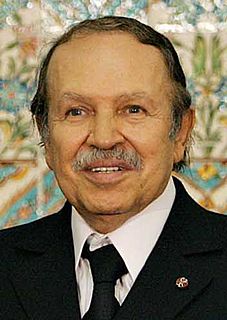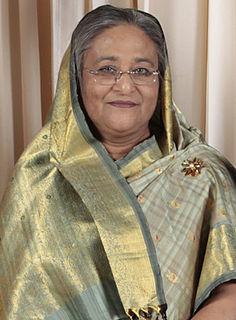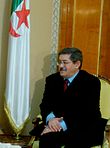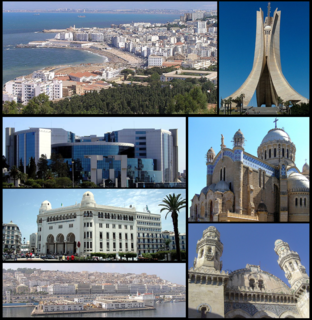The History of Algeria from 1962 to 1999 includes the period starting with preparations for independence and the aftermath of the independence war with France in the 1960s to the Civil War and the 1999 presidential election.

The Democratic National Rally is a political party in Algeria. It is led by the Prime Minister Ahmed Ouyahia. The party held its Second Congress on 15–17 May 2003.

The Islamic Salvation Front was a Sunni Islamist political party in Algeria. The party had two major leaders representing its two bases of its support. Abbassi Madani appealed to pious small businessmen, and Ali Belhadj appealed to the angry, often unemployed youth of Algeria.

Presidential elections were held in Algeria on 8 April 2004. Incumbent President Abdelaziz Bouteflika was re-elected with 85% of the vote.

Algeria elects on national level a head of state - the president - and a legislature. The president is elected for a five-year term by the people. People's National Assembly has 462 members, elected for a five-year term in multi-seat constituencies by proportional representation. Eight seats in the national assembly are reserved for Algerians abroad. The Council of the Nation has 144 members, 96 members elected by communal councils and 48 members appointed by the president. Algeriawesh alors has a multi-party system, with numerous parties in which no one party often has a chance of gaining power alone, and parties must work with each other to form coalition governments. According to a US Embassy cable, the 2009 presidential elections were "carefully choreographed and heavily controlled", with the official turnout figure "exaggerated" by at least 45%.

Parliamentary elections were held in Algeria on 5 June 1997. The result was a victory for the National Rally for Democracy (RND), a new party created in early 1997 for President Zéroual's supporters, which won 156 out of 380 seats. They were followed by the Movement of Society for Peace with 69 seats, the FLN (62), and the Islamist Ennahda (34). The two Berberist parties, FFS and RCD, got 20 and 19 seats respectively. Views on this election were mixed; most major opposition parties filed complaints, and the success of the extremely new RND raised eyebrows. The RND, FLN, and MSP formed a coalition government, with the RND's Ahmed Ouyahia as prime minister.

Legislative elections were held in Algeria on 17 May 2007. 24 political parties and around 100 independent lists with a total of more than 12,000 candidates competed for the 389 seats in the National People's Assembly. While most Algerians voted on May 17, immigrants from Algeria to other countries and Algerians living in the Sahara and other nomads and semi-nomads voted on May 16 due to the distance from Algiers, the country's capital.
The 2002 Moroccan parliamentary election was held in Morocco on 27 September 2002. The election was the first since King Mohammed VI of Morocco had come to the throne in 1999 and international observers saw it as a test of his commitment to democracy. The election saw an Islamist party the Justice and Development Party make strong gains but the outgoing government kept a majority in the Assembly of Representatives.
Parliamentary elections were held in Albania on 24 June 2001. The result was a victory for the ruling Socialist Party of Albania, which won 73 of the 140 seats, resulting in Ilir Meta remaining Prime Minister. Voter turnout was 53.6%.

The 1999 Algerian presidential election took place on 15 April 1999 to elect the President of Algeria. Abdelaziz Bouteflika was elected with 73.8% of the vote after the other six candidates withdrew on the eve of the election.

Parliamentary elections were held in Mauritania on 23 November. The opposition has vowed to boycott the election unless the president steps down beforehand. A total of 1,096 candidates have registered to compete for the leadership of 218 local councils across Mauritania, whilst 438 candidates are contesting for the 146 parliamentary seats. Some 1.2 million Mauritanians were eligible to vote in the election. The first round results yielded a landslide victory for the ruling UPR winning 56 seats and their 14 coalition partners winning 34 seats. The Islamist Tewassoul party won 12 seats. The remaining seats were contested in a runoff on 21 December 2013. The UPR won the majority with 75 seats in the Assembly.

General elections were held in Bangladesh on 5 January 2014, in accordance with the constitutional requirement that the election must take place within the 90-day period before the expiration of the term of the Jatiya Sangshad on 24 January 2014. The elections were controversial, with almost all major opposition parties boycotting and 153 of the total 300 seats being uncontested. Around 21 people were killed on election day.

A legislative election was held in Algeria on 10 May 2012. The incumbent coalition, consisting of the FLN of President Abdelaziz Bouteflika and the RND of Prime Minister Ahmed Ouyahia, held on to power after winning a majority of seats. The Islamist parties of the Green Algeria Alliance lost seats.
Events from the year 2012 in Algeria

Presidential elections were held in Algeria on 17 April 2014. Incumbent President Abdelaziz Bouteflika was re-elected with 82% of the vote. Issues in the campaign included a desire for domestic stability after the bloody civil war of the 1990s, the state of the economy, the frail health of the 15 year incumbent and 77-year-old president whose speech was "slurred and inaudible" in his only public outing during the campaign, and the less-than-wholehearted support given the president by normally united and discrete ruling class.

General elections were held in Bahrain on 22 November 2014, with a second round on 29 November in constituencies where no candidate received at least 50% of the vote. The elections were boycotted by the Shiite Islamist opposition. The government announced the voter turnout as 52.6%, although the opposition claimed it was only 30%.


















